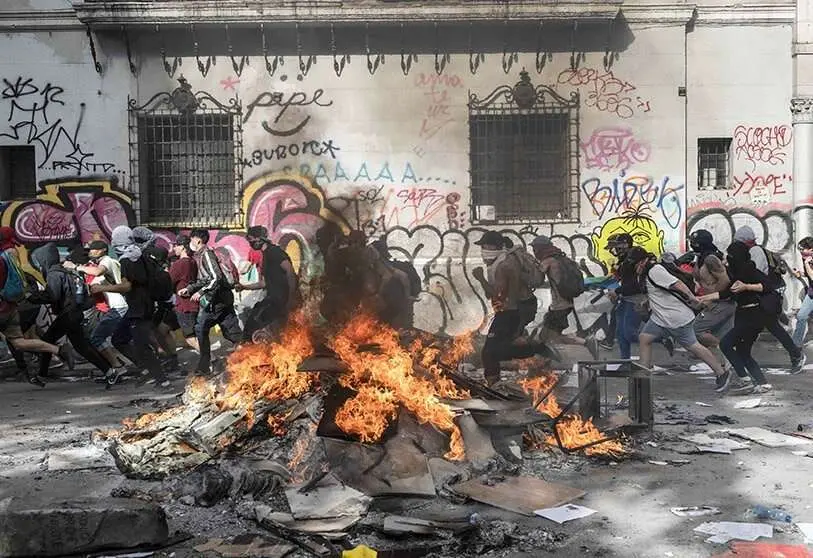Social outburst revived in Chile

Chile is angry and, for now, does not intend to calm down. This month marks the first anniversary of the social explosion of October 18, 2019, a date that marked the recent history of the country. Last Friday, a 16-year-old youth demonstrating in Santiago, the South American country's capital, was injured after falling from the top of a seven-metre bridge into the Mapocho River, the city's main river, by the action of a carabinero (militarized police).
The officer was accused of "attempted murder" by the public prosecutor's office and is now in custody, but protests continue and threaten to spread across the continent.
The crisis broke out in Chile when, following the recommendation of a panel of public transport experts, President Sebastián Piñera's government decided to raise the price of a metro ticket by 30 pesos, reaching a maximum of 830 pesos (about 1.05 euros).
The minimum wage in Chile is 301,000 pesos (320 euros) while, according to the National Institute of Statistics of Chile, half the workers in that country receive a salary equal to or less than 400,000 pesos (430 euros) per month. With this salary, protesters argued that a rise in the price of a metro ticket was inconceivable. Since then, millions of Chileans have taken to the streets to protest against the Piñera government.
Now the event has shocked Chile and unleashed a new wave of criticism against the Carabineros for the repression during the demonstrations. The independent National Institute of Human Rights (INDH), which has monitored the social outbreak since it began in October 2019, assured that the young man is stable and asked the Carabineros to “clarify the situation.”
The INDH also called on the government to comply with the reparation policies it announced for the victims, such as the plan to help those with eye injuries, and called on police authorities not to repress future demonstrations. "This is a month where Chileans are going to express themselves, and we want these expressions to be peaceful and for the Carabineros of Chile to learn their lesson," said Sergio Micco, the director of the institution, after a meeting with the Interior Minister. According to the latest report from the Public Prosecutor's Office, since October 2019 there are 8,575 victims of alleged human rights violations by police officers.
Now, images recorded by a television channel showing the young man falling into a river channel with hardly any water after being thrown over a bridge railing, allegedly by a police officer, are hitting the whole country.
This episode rekindled criticism against the police authorities, which since the beginning of the social outbreak in Chile, in October 2019, have been strongly questioned for their actions when repressing the protests. "Anyone who wants to demonstrate should do so, but in peaceful terms, violence creates difficulties and we hope that anyone who takes to the streets will respect the rights of others," said Interior Minister Víctor Pérez.
For his part, the President of the Government, Sebastián Piñera, stated at a press conference that they had met to analyse and coordinate the actions that were going to be taken in these times of adversity and ratified their commitment to peace. He also called for the country to reaffirm its commitment to institutionalisation so that the strong protests at the end of 2019 would not be repeated. In this sense, he called for all political forces and different sectors of the citizenry to condemn violence "wherever it comes from".
Meanwhile, the political opposition is calling for the resignation of the director general of the Carabineros, Mario Rozas, and a constitutional accusation has been filed in Parliament against the minister of the interior, Víctor Pérez, calling for his dismissal.
When the health crisis broke out in March, Chile's social movement was showing its strength in the streets. COVID-19, however, put the brakes on street demonstrations. But as restrictions on mobility due to the pandemic have begun to be lifted and almost all of Santiago has been left without a quarantine, concentrations have resumed in Plaza Italia, although health measures prohibit the gathering of more than 50 individuals.
Human Rights Watch (HRW) reported that during the social uprisings a year ago, the Carabineros used excessive force, abuses and "serious human rights violations". According to a report by the Public Prosecutor's Office with data updated to March, out of 493 persons reported for various crimes committed by state agents, 444 belong to Carabineros, 30 to the Investigation Police, 13 to the Army, four to the Navy and two to other institutions.
All this is taking place in a context that keeps the country more attentive to politics than ever before. On October 25 Chile faces a historic plebiscite to decide whether or not to replace the Fundamental Charter of 1980 drafted during Pinochet's dictatorship. Events have put the authorities of Mr Piñera's government under pressure. On the one hand, the Executive must guarantee public order and, on the other, it cannot afford new police abuses that could trigger a new wave of protests.










